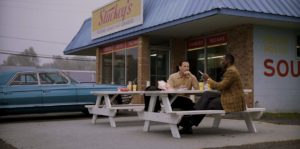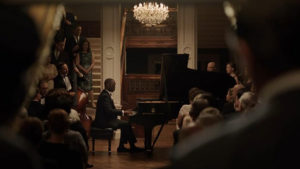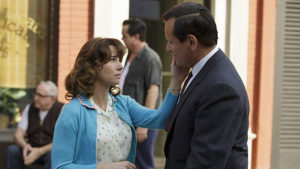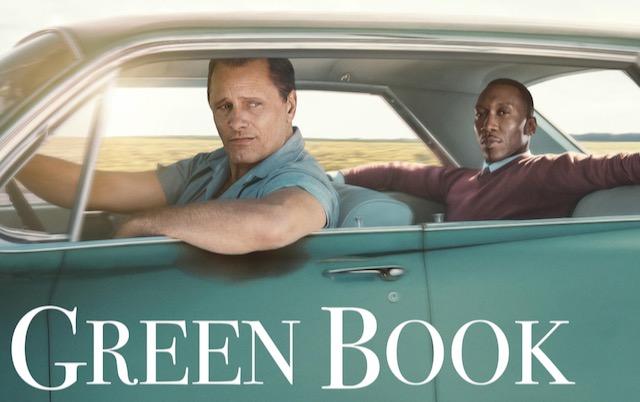Movie Info
Movie Info
- Director
- Peter Farrelly
- Run Time
- 2 hours and 10 minutes
- Rating
- PG-13
VP Content Ratings
- Violence
- 3/10
- Language
- 4/10
- Sex & Nudity
- 3/10
- Star Rating
Relevant Quotes
Two are better than one, because they have a good reward for their toil. For if they fall, one will lift up the other; but woe to one who is alone and falls and does not have another to help.
But now in Christ Jesus you who once were far off have been brought near by the blood of Christ. 14 For he is our peace; in his flesh he has made both groups into one and has broken down the dividing wall, that is, the hostility between us. Ephesians 2:14-15 (The Message)

The trailer for Peter Farrelly’s new film might remind you of Driving Miss Daisy, with the passenger and driver’s roles reversed. You would not be far off, and thus would be well alerted as to what will happen before ever setting foot into the theater. The story is indeed predictable, and not very subtle. Fortunately it moves beyond the cliché of a black-white relationship benefitting both characters, managing to reveal that American racism is more than changing the hearts and minds of individuals–it is also institutional or systematic racism that we have to deal with. Best of all, the film presents two excellent actors who rise above the script’s somewhat stereotyped roles and keep our eyes glued to the screen because of the knowledge that the film is “inspired by a true story.”
Bronx-dwelling Tony Vallelonga (Viggo Mortensen), known as Tony Lip, is the rube opposite the cosmopolitan Dr. Donald Shirley (Mahershala Ali). Tony’s job as bouncer at New York’s Copacabana Club is put on hold when the club is shut down for renovation by the complaint of a drunken but influential customer whom Tony had tossed out and beaten up. He looks forward to spending more time with his wife Dolores (Linda Cardellini) and their two young sons, turning down a lucrative offer to work with a gang of mobsters. However, he does respond positively when he is called about “a doctor” who needs a driver.
Tony is perplexed when he arrives at the address given him, and it turns out to be Carnegie Hall. When he explains he is looking for a doctor, he is told that the title is an academic one and that Dr. Don Shirley does live above the hall. He is surprised at how lavishly the apartment is decorated. Dr. Shirley explains that he needs a chauffeur for the eight weeks leading up to Christmas, one who will also serve as protector because his concert tour is set mostly in the deep South. It is 1962, the year after the Freedom Riders had elicited violent responses in the South when they tried to integrate buses and station restrooms. He also asks if it would be a problem to work for a black man. Tony says it is not, even though earlier we had seen evidence of his racism when two black plumbers had worked on the kitchen sink in his apartment. His welcoming wife had offered them something to drink, and when the men left, Tony had gone to the kitchen and tossed the glasses they had used into a wastebasket. (Dolores had quietly removed them.)

Tony, expressing his desire to be with his family, says he will accept only if paid more and that they can return by Christmas Eve. Shirley turns him down, but later calls him, agreeing to pay him what he had demanded. Later, the musician even calls Dolores to thank her for giving up her husband during the next two months.
Dr. Shirley performs with two fellow musicians, bassist George (Mike Hatton) and Russian cellist Oleg (Dimiter D. Marinov), so the record company has provided two tail-finned Cadillacs for their trip, the parties meeting up at the clubs, mansions, and school halls where they will be playing. There is tension between Tony and Shirley due to their class and racial differences. Tony is surprised that his boss is not familiar with the music he is playing on the radio, a song by Little Richard. Or that Shirley does not eat fried chicken (don’t all blacks feast on it?), turning it down when offered. Taking a piece out of the Col. Sanders’ bucket, the driver insists, until at last the man in the rear seat grudgingly accepts, holding it as if it were something the cat had dragged in. Not eating anything with his fingers is also a “No, No” for him. On the other hand, Tony gives in to his boss’s demand when he casually tosses out the window his beverage cup. He stops and backs up the car to retrieve it.
During their conversations Shirley reveals his loneliness resulting from not belonging to the black or the white worlds, as well as being divorced and alienated from his brother. The Green Book that he has brought along as their guide to southern facilities accentuates this. There are so few places in the Jim Crow South that will house or feed Negroes that such a guidebook is a necessity for African Americans wanting a safe and secure journey through what amounts to enemy territory. Most of the motels listed turn out to be pretty seedy compared to the ones where Tony and the other members of the trio can stay. To Tony’s comments on southern segregation Shirley replies, “Does geography really matter? Would it be any different in a bar in your neighborhood?”
Of course, they do encounter dangerous and/or humiliating situations. At a posh affair Shirley is not allowed to use the restaurant facilities. They are stopped by a racist cop in Alabama and jailed when Tony loses his temper over being insulted because of his Italian heritage. In several instances Tony has managed to extricate them either by muscle or his glib tongue, but this time it is Shirley ’s friendship with U.S. Attorney General Robert Kennedy that springs them from jail after a phone call. Shirley explains that they must always use nonviolence, his goal being to win by maintaining his dignity.
As they warm up to each other, Shirley giving as much as receiving from their relationship, we see a humorous touch of Cyrano de Bergerac in the sequence in which Tony is keeping his promise to Dolores to write her often. Tony’s one-sheet letters are written in short sentences with lots of crossed out words. During a lunch outside a Stuckey’s Shirley asks to see what his driver is writing and offers to help in their composure. He dictates lines containing similes that make the missives far more interesting. After several such sessions of dictation Tony catches on, able to better express his deep love for his wife and how much he is missing her. In shots that show her smiling as she reads them, we see how much she is pleased.

This road trip/buddy film aims for the heart. That it ends on Christmas Eve adds to its emotional impact. The festive Vallelonga family feast that the now changed Tony returns to will remind some believers of the Messianic banquet depicted by Jesus about a time beyond time when all people will sit down at a laden table to celebrate the triumph of goodness over evil. The film recognizes that although individual hearts can be changed, racism itself will go on until society itself is transformed. In several instances Shirley has to swallow his pride and, if he resists, pay the price, this being especially the case when he arrives at a fancy night club and told he cannot use the facilities or eat there before his performance. No argument, not even his threat to refuse to play has any effect upon the white manager.
The film’s effectiveness is especially due to the talents of the two stars. Viggo Mortensen, putting on 30 pounds, is convincing as the family-devoted but prejudiced Italian in need of cultivation of manners and temperament. He is rough but possesses an inner core of decency that connects to that of his erudite boss. Mahershala Ali conveys the loneliness of the Outside who is at home in neither the white or the black world. His insistence upon his dignity becomes a major attraction to Tony, opening the latter’s mind and heart to their common humanity.
There has been some negative reaction to the film from Dr. Shirley ’s family, members of which claim that Tony has been made the hero of the story, typical of the Hollywood practice of depicting whites as a savior figure for needy blacks (as in Blindside or Cry Freedom). It is true, as they point out that the writing team consists of three white men–Peter Farrelly, Nick Vallelonga, and Brian Hayes Currie—so that I wish they had reached out to consult with the black family members during the script writing process. However, I think when you see the film it will be evident that Dr. Shirley’s character is just as much center-stage as his white employee. Tony’s son Nick is one of the scriptwriters and reports that as far back as the 80s he had talked with Dr. Shirley about turning the story of his father and the artist into a film—and that Dr. Shirley, whom he as well as father had visited many times, told him to wait until he had passed on, but to tell the truth about them both. This apparently meant his gayness which is depicted in a scene set in a YMCA, something that perhaps he did not want to contend with during that anti-gay period (Dr. Shirley died in 2013, just a few months after Tony passed away.)
I hope the two complaining relatives will decide to see the film and come to realize that, though written and directed by white men, does pay genuine tribute to Dr. Shirley. One scene alone should convince them of that. The script apparently includes some words from a New York Times 1982 interview, “Jazz piano players smoke while they’re playing, and they’ll put the glass of whisky on the piano, and then they’ll get mad when they’re not respected like Arthur Rubinstein. You don’t see Arthur Rubinstein smoking and putting a glass on the piano. I am not an entertainer. But I’m running the risk of being considered an entertainer by going into a nightclub because that’s what they have in there. I don’t want anybody to know me well enough to slap me on the back and say, ‘Hey, baby.’ The black experience through music, with a sense of dignity, that’s all I have ever tried to do.”
That he achieved his goal is well evidenced in the many portions of songs that Shirley is depicted as playing. They are a mixture of jazz, pop, and classical, “Lullaby of Birdland” perhaps being the longest. Early on as Tony stands at the back watching his boss play, we can see the beginning of his respect for him. In typical Tony fashion he tells his wife that he’s as good as Liberace. This biographic film might not be billed as a musical, but it is certainly music-filled. Giovanni Russonello’s New York Times’ article “Who Was Don Shirley? ‘Green Book’ Tries to Solve the Mystery” writes that the film’s soundtrack composer Kris Bowers, himself a pianist, was impressed by Shirley’s musical inventiveness when he listened to Shirley’s many records to decide which he would rerecord. He declares, “’Lullaby of Birdland’ was one of the first ones that I knew I wanted to include, because he starts off quoting a couple of classical pieces, and then when he goes into the song, it’s almost like a false start, because he uses the melody as the beginning of a fugue,” Bowers said in an interview. “He’s doing a proper fugue, exposing the subject, et cetera, within a jazz context. I listened to that and said, ‘Wow, I’ve never heard anybody do that before.’”
The script does err in failing to reveal that Don Shirley was far more accomplished and familiar with jazz than revealed in the script—he was a friend of Duke Ellington, for instance, debuting in 1955 the latter’s “New World a-Comin’” at Carnegie Hall. He also was a composer whose classical works had been recorded and played by major symphonic orchestras in this country and London. He was such a talented painter that one of his works was used as the album cover for his album Don Shirley: An Improvisation Based on the Story Orpheus in the Underworld, which you can see at https://www.youtube.com/watch?v=N2yCYAki3Yo. Knowing this makes his treatment by southern hosts seem all the more reprehensible. It also calls for someone to make a full biography of this amazing, but largely overlooked. (Check him out in Wikipedia to see why I write this.)
The film’s coming out near the beginning of the Christmas season makes it all the more timely, given its Holiday ending, one that called to my mind the heart-warming conclusion of the 2005 film Lassie, in which the dog, long separated from his beloved master, returns home after a 500-mile journey, boy and dog united when during the village church’s Christmas Eve service. This is a good film for any season when “the dividing wall” of hostility is still very much with us. The Christmas cheer conclusion make this an excellent choice to see and discuss as a group.
Note: On YouTube you can hear Don Shirley playing a great many songs. Even as I write this I am listening to his exquisite rendition of “Bridge Over Troubled Waters” at https://www.youtube.com/watch?v=pDEyBw_N2bA. Many other videos await me at the right side of the screen.
This review will be in the December issue of VP along with a set of questions for reflection and/or discussion. If you have found reviews on this site helpful, please consider purchasing a subscription or individual issue in The Store.

